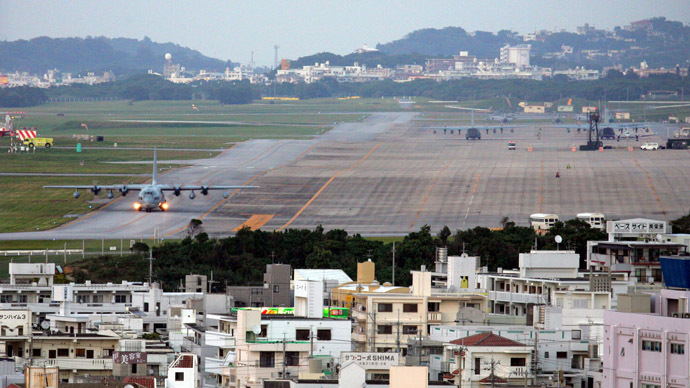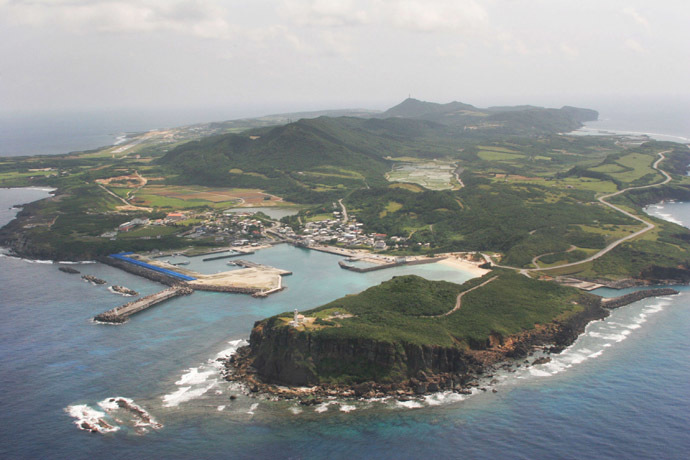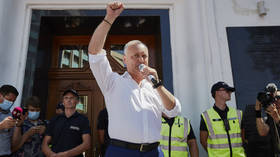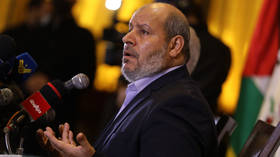‘US military in Okinawa: 70 years of crimes, militarism, pollution’

Okinawans are not likely to back down and will continue to struggle for the dismantling of the US base, said journalist Jon Letman. Americans should also speak about the suffering of people of Okinawa and support changes in the region, he added.
There has been a confrontation between the Tokyo government and Okinawa authorities over the US military base on the southern Japanese island. Tokyo continues to back the idea to relocate the Futenma airbase from one part of Okinawa to another. Governor Takeshi Onaga backed by protesters claims the US presence damages the environment, and sparks more crime involving the US military.
READ MORE: Tokyo begs Okinawa governor to okay planned US air base
RT has discussed the situation with independent journalist Jon Letman. He explained that the conflict dates back to 1995 when three US servicemen from Camp Hansen kidnapped and raped a 12-year-old Japanese girl.
The high-profile case was largely behind the decision to relocate the Futenma airbase, which was located in the very crowded area of Ginowan City – “to the north of the island to a sparsely populated part of the island,” he said.
However, there have been protests against the move. Asked whether the Okinawa Governor Takeshi Onaga will manage to stop the construction of the new military base, the journalist said: “That is a question that everybody has been asking, and so far, he has not been [able to do so]”.
“This is going to be a long-running conflict that appears, it could be a protracted battle in the courts. They have already kind of started out there. The governor has called for the stoppage of seabed drilling, and that was countered quickly by the fisheries minister immediately after. So this has already headed towards the courts. So we will see if Governor Onaga is going to continue with this and how much pushback he is going to face from Tokyo and from Washington,” Letman told RT.
He said that Onaga “has got the people behind him for sure in Okinawa.”
“You have got an overwhelming majority of people who have had it for 70 years - of being occupied, militarism, crime, pollution, noise that goes along with these bases,” he added.
Letman said that governor definitely has support among the locals. However, Washington and Tokyo are pushing very hard for this base.
The journalist argues that the main grievances that Okinawans have are sexual violence and crime, and the noise that goes along with these bases.
“The fact that you’re moving from a very crowded, densely populated place to a place that is really pristine - Henoko and Oura Bay which is one of the most beautiful and pristine undamaged parts of East Asia, particularly in Japan, that have got incredible biodiversity…So all these things are facing threats from this increased militarism,” Letman told RT.
He said that moving this base will not solve the problem: “That seems very unlikely. I don’t think that the people of Okinawa are going to back down. They have been protesting 24/7 for many hundreds, if not thousands of days. It doesn’t seem likely that they would back down. This is something that needs to change...”
“I would like to see more Americans who are directly involved in this, and indirectly involved be far more aware and to speak out and to say: ‘Hey, we are not going to be part of this, we don’t want to be pushing this on other people, they have been dealing with this for 70 years. It is time for change!’” he added.

Catherine Fisher - first rape victim to speak out
It took 12 years for one of the victims, Catherine Fisher, to get justice.
RT:It's not easy to go public with a story like yours. Can you tell why did you do it?
Catherine Fisher: At first I thought obviously I was the only rape victim in Japan by US military servicemen. But after doing my own research I realized that for the past 70 years US military servicemen have been raping, murdering and committing crimes against Okinawans ... Nobody was speaking up about it – the servicemen had received immunity. That is the reason why I wanted to speak up.
RT:Why do you think the perpetrator of the crime didn't face justice?
CF: I’ve been told that it is due to the secret agreements that were in place at that time. In my own case I was treated like a criminal and I had to look for the rapist by myself. When I finally did find him 10 years later the Japanese government …when I had a meeting with them, I said: “Would you please send my court documents to the US?” And they said that they could not afford to send such documents there. They couldn’t even afford a postage stamp. And that is why I had to still continue and file a case in the US.
RT:Do you think the situation has changed since your attack, and Okinawan are facing fewer crimes now?
CF: I would say no, nothing has changed… I’m working with three different cases at the moment which are not US military servicemen … But the Japanese police and the court system here is so outdated and nothing has changed in my opinion.
RT:The incident happened over ten years ago but just a short time ago you have started openly sharing your story. Why now?
CF: I wrote a book which took me 13 years to write. That will be published in Japanese in May of this year which is quite soon. But the thing is if nobody speaks out then nothing can change, and it is though the sufferings of human beings that the world would advance. Basically I couldn’t just leave and go back to Australia when there is so much here to be done. There weren’t even 24-hour rape crisis centers available in this country in this century- it is just unbelievable. It was a grassroots movement that started all of this and I was the first rape victim to speak to out in public.
The statements, views and opinions expressed in this column are solely those of the author and do not necessarily represent those of RT.
The statements, views and opinions expressed in this column are solely those of the author and do not necessarily represent those of RT.













